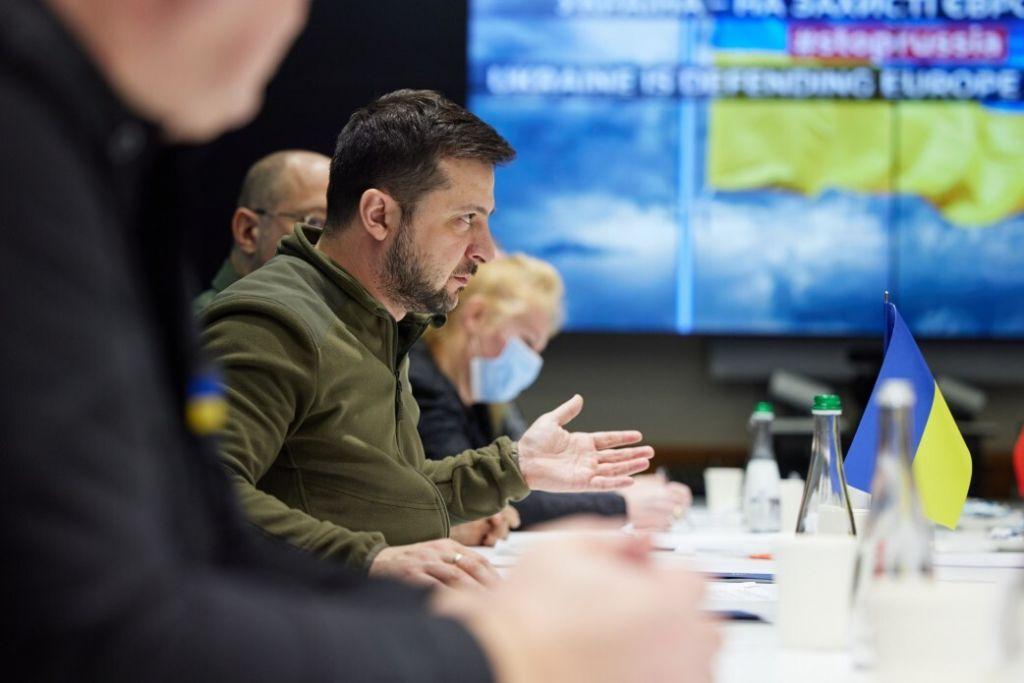Ukraine’s case for EU membership
Posted By Charles Tannock on July 6, 2022 @ 06:00

In September 2002, I published a commentary [1] in The Wall Street Journal entitled ‘Kyiv has a case for the EU.’ I was a first-term member of the European Parliament and, I believe, the first elected official anywhere to openly support Ukraine’s inherent right to future European Union membership. Nearly 20 years later, the EU has at long last decided [2] to grant Ukraine candidate status. The move is both momentous and fully justified.
For most of the intervening two decades, Ukraine’s declared Euro-Atlantic aspirations had remained just that. As a European Parliament rapporteur for the 2004 European Neighbourhood Policy (ENP) report and again as rapporteur for the Eastern Partnership Dimension in 2007, I had long battles to convince my German and French colleagues of the merits of Ukraine’s EU case.
To its credit, the European Parliament in 2007 settled for compromise wording [3] that was vague but hopeful. It did not reject Ukraine’s right, under Article 49 [4] of the Treaty on European Union, to join the bloc. But nor did it suggest, as had been the case since 2004 for the countries of the Western Balkans [5], that Ukraine was entitled to the formal status of a ‘candidate’ or ‘potential candidate’ country.
Importantly, Article 25 of the 2004 ENP report [6] clearly stated that EU membership for Ukraine remained ‘possible’, and this was restated in the next ENP report in 2007 [3]. But the 2011 ENP report [7] did not mention any individual countries as potential candidates, so Ukraine’s EU membership aspiration was not noted.
The heady days of Ukraine’s 2004 Orange Revolution and the Maidan Revolution a decade later culminated in the 2014 EU–Ukraine Association Agreement [8], which included a ‘deep and comprehensive free trade area’. But the agreement merely confirmed that the EU acknowledged Ukraine’s European aspirations and welcomed its European choice, including its commitment to building a sustainable democracy and market economy.
The pact made no mention of the country’s Article 49 rights to EU membership, nor of the Copenhagen criteria [9] it would need to fulfil as a formal prerequisite for candidate status. These criteria stipulate that an EU candidate state must have democratic institutions and a functioning market economy, uphold fundamental human rights, and accept the obligations of membership.
But EU enlargement is essentially a political decision by member states, based on a multitude of considerations that sometimes include dramatic events. Russia’s war of aggression against Ukraine is such a turning point.
The robustness of Ukraine’s institutions and the strength of its civil society in the wake of Russia’s invasion have generated a sense of awe in the West. The country’s resilient government stood its ground as the invading barbarians massed at the gates of Kyiv. The country’s railways [10] have continued to operate while under massive attack by a major military power. Then there is the courage [11] of Ukraine’s armed forces and the sacrifices of civilians [12] targeted directly by Russian missiles. Russia’s war crimes [13], including the rape and murder of civilians in occupied territories, have shocked the West and spurred the change of mindset among EU members that made Ukraine’s candidacy possible.
With its large, highly educated population [14], Ukraine could one day play a strategic role as a bridge between Western and Central Europe and Russia. After all, the EU allowed Turkey to become a negotiating candidate [15], with all the geographical and cultural controversy the move provoked, on the grounds that Turkey was a bridge [16] between Europe and the Islamic world. Surely Ukraine has the same or perhaps an even greater right to a roadmap for its long-term goal of EU membership. Unfortunately, it has taken a brutal war for the EU finally to come to its senses and fully appreciate that its security interests are tied tightly to Ukraine’s independence and European outlook.
Once Russia’s vicious attempt to re-establish an empire by force is finally defeated [17] and its forces are permanently driven from Ukraine, the country will need a vast reconstruction program [18] that mobilises financial aid to rebuild its war-ravaged infrastructure. But Ukraine’s efforts to build a democracy from scratch—particularly since Russia’s illegal 2014 annexation of Crimea and the subsequent war started by its proxies in the eastern Donbas region—deserve greater recognition. The association agreement and the free-trade deal have already brought about significant structural reforms, with Ukraine implementing as much as 60% of the acquis communautaire [19] (the body of EU law). This will give it a head-start when accession negotiations begin.
EU candidate status will further encourage the reforms needed to strengthen the independence of the judiciary, bolster democracy and human rights, protect minorities, and combat corruption and cronyism, with the European Commission supervising the process and neighbouring EU countries providing the necessary expertise.
Given Europe’s looming demographic problems and the United Kingdom’s regrettable departure from the EU, a pool of highly skilled Ukrainians will be a favourable addition to the European workforce. And, as the war has dramatically shown, Ukraine’s EU accession will bring other benefits related to food security and defence capabilities.
It will be many years before Ukraine becomes an EU member, but the country’s candidate status is a strong morale boost in its existential war against Russia. The EU must now ensure that Ukraine eventually takes its place where it belongs—in the European family.
Article printed from The Strategist: https://aspistrategist.ru
URL to article: /ukraines-case-for-eu-membership/
URLs in this post:
[1] commentary: https://www.wsj.com/articles/SB1031263934285857435
[2] decided: https://www.politico.eu/article/eu-leaders-grant-ukraine-and-moldova-candidate-status/
[3] wording: https://www.europarl.europa.eu/doceo/document/A-6-2007-0414_EN.html
[4] Article 49: https://eur-lex.europa.eu/EN/legal-content/summary/treaty-on-european-union-joining-the-eu.html
[5] Western Balkans: https://www.europarl.europa.eu/factsheets/en/sheet/168/the-western-balkans
[6] 2004 ENP report: https://www.europarl.europa.eu/doceo/document/A-6-2005-0399_EN.html
[7] 2011 ENP report: https://www.europarl.europa.eu/doceo/document/A-7-2011-0400_EN.html
[8] 2014 EU–Ukraine Association Agreement: https://eur-lex.europa.eu/legal-content/EN/ALL/?uri=CELEX%3A22014A0529%2801%29
[9] Copenhagen criteria: https://ec.europa.eu/neighbourhood-enlargement/enlargement-policy/glossary/accession-criteria_en
[10] railways: https://english.elpais.com/international/2022-06-01/resistance-on-rails-how-ukraines-biggest-employer-is-keeping-the-country-moving.html
[11] courage: https://www.euractiv.com/section/europe-s-east/opinion/the-bravery-and-courage-of-the-ukrainian-armed-forces-is-fascinating/
[12] sacrifices of civilians: https://www.voanews.com/a/russia-launches-new-attacks-in-eastern-ukraine-/6523002.html
[13] war crimes: https://www.hrw.org/news/2022/04/03/ukraine-apparent-war-crimes-russia-controlled-areas
[14] highly educated population: https://ukraineinvest.gov.ua/invest-in-ukraine-now/key-advantages/educated-workforce/
[15] negotiating candidate: https://carnegieeurope.eu/2022/01/26/new-way-forward-for-eu-turkey-relations-pub-86264
[16] bridge: https://www.researchgate.net/publication/237250853_Turkey-Europe
[17] finally defeated: https://www.project-syndicate.org/bigpicture/what-s-the-endgame-in-ukraine
[18] reconstruction program: https://www.politico.eu/article/ukraine-needs-e500b-to-600b-for-reconstruction-commissions-dombrovskis/
[19] 60% of the acquis communautaire: https://www.csis.org/analysis/ukraines-road-eu-membership
Click here to print.